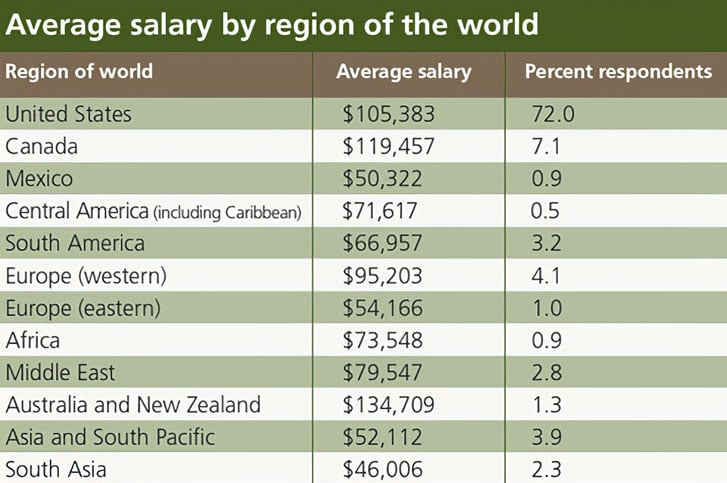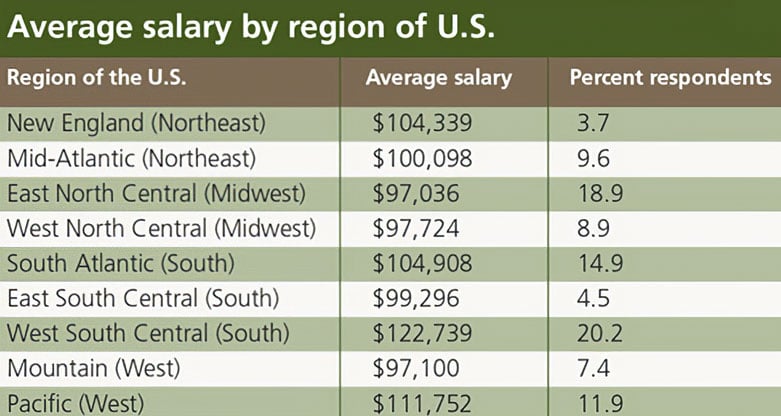This is an excerpt from the September/October 2014 of InTech magazine by Rick Zabel, vice president, publisher and editor at Automation.com. To read the full article, please see the link at the bottom of this post.
This year we took a minimalist approach with our salary survey. We kept it short and sweet and only asked for the data that we felt was most important in determining your salary. Those factors include:
- Geographic region
- Job function
- Level of education
- Industry segment
- Years of experience
Salaries for automation professionals are holding steady. This steady level is not indicative of “what should be” the demand for automation expertise. I believe the issue lies with manufacturers’ unwillingness to invest in new technology, software, and operational improvements. Many facilities are operating on old technology and therefore are not reaping the true benefits of a fully integrated automation/business enterprise. I congratulate those manufacturers that have invested; it is only a matter of time before the masses follow. And, when they do, their demand for automation expertise will increase significantly. With increased demand comes increased salaries. That is, if automation follows the traditional economic model.
The good news is it is currently a job seeker’s market and will remain so for the long term. Because of the shrinking workforce, there are more jobs in the market than qualified automation professionals. In fact, if you are unhappy with your current job situation, there are other opportunities available. You just have to look for them.
Let’s dig into the salary data. InTech magazine again collaborated with Automation.com to conduct the annual salary survey. Our survey collected 3,448 responses from automation professionals located around the world, with 71.4 percent from the U.S. Because salaries around the world vary greatly, we separated out the U.S. responses to avoid skewing results. All the results quoted in this article, other than “Average salary by region of the world,” represent U.S. responses only.
Snap shot of typical respondents
The job function of the typical survey respondent was an automation/control engineer, accounting for 38.4 percent of total responses. The most prominent “years of experience” category was 31 or more, indicated by 21.7 percent of respondents. More than half (53.2 percent) of the respondents were college graduates with a bachelor’s degree, and 17.1 percent received an advanced degree. Of respondents, 82.5 percent reported salary increases this year, with the largest percentage (36.4 percent) realizing a 3 – 4 percent increase.
The largest percentage of respondents (25.9 percent) reported a salary in the $100,000 – $124,999 pay range. The second largest percentage (12.9 percent) reported a pay range of $90,000 – $99,999.
Now, let’s dive a little deeper into the results.
Salary facts by region
The average salary in the U.S. is $105,383. Two other regions of the world reported a higher average salary. Canadian respondents reported an average salary of $119,457, while those from Australia and New Zealand reported a whopping $134,709. It is interesting to note that the dollar exchange rate in both of these regions is fairly close to a 1:1 ratio. However, the cost of living is typically higher in both regions, and the average salaries reflect those higher living expenses.
Within the U.S., the highest paid region is the West South Central (South), with an average salary of $122,739. The lowest paid region is the East North Central (Midwest), with an average salary of $97,036. Click this link to view region definitions.
It all depends on what you do
Your job function within the automation profession can come with a salary swing of more than $44,400. On the low end, those in maintenance and operations are earning $88,509 per year. On the high end, engineering management commands a $132,950 salary. The average salary of the largest percentage of respondents by job function (38.2 percent, automation/control engineering) was $103,916. The top five highest-paid job functions are listed below.
- Engineering management: $132,950 (7.6 percent of respondents)
- General or operations management: $123,765 (3.5 percent of respondents)
- Consulting engineering: $123,193 (4.2 percent of respondents)
- Sales – business development: $119,305 (7.5 percent of respondents)
- Project management: $113,863 (4.2 percent of respondents)
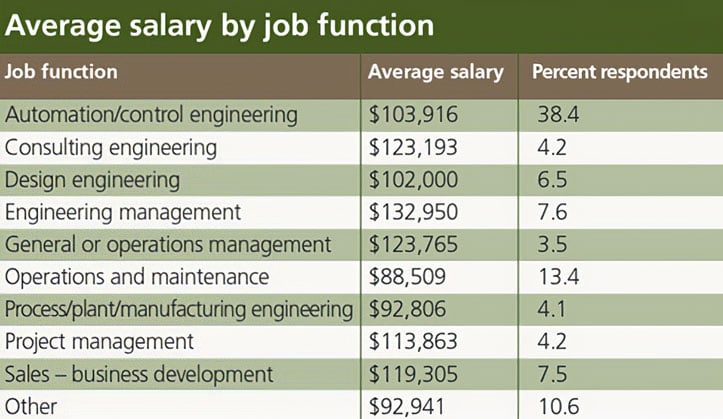
A degree of higher learning
Regarding higher education, 70.3 percent of respondents possessed a college degree or higher. The average salary of college graduates (without further graduate school) was $107,627. Those respondents who either attended some graduate school or completed an advanced degree reported an average salary of $120,004—that’s a $13,147 increase over college graduates. If you factor in that increase over your career, it certainly pays to get that advanced degree.
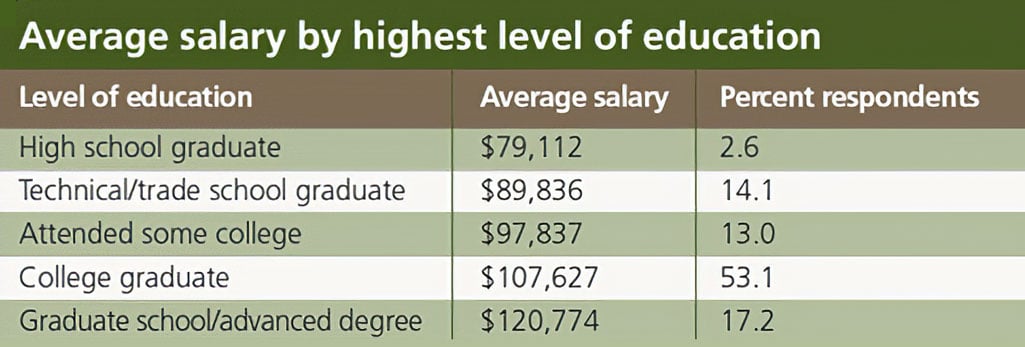
Industry segment dictates pay
Not surprisingly, the biggest payer is the oil and gas industry segment. The largest number of responses came from the engineering consulting or systems integration segment (23.4 percent), where the average salary is $113,522. Refer to the following table for salaries by all industry segments.
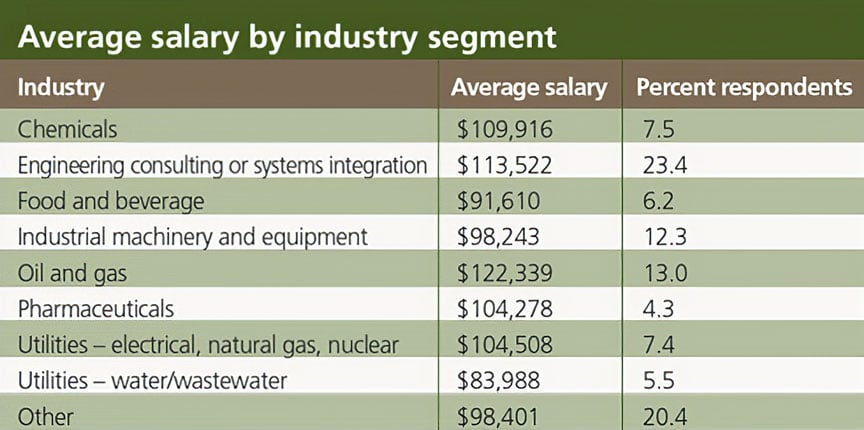
With years, comes more money
As you would expect, the average salary varies greatly by years of professional work experience. Based on the data, over the course of your career, you can expect to nearly double your salary. The salary of those with fewer than two years of experience is $62,017. Those respondents who put in 31 or more years are bringing home $122,499 per year.
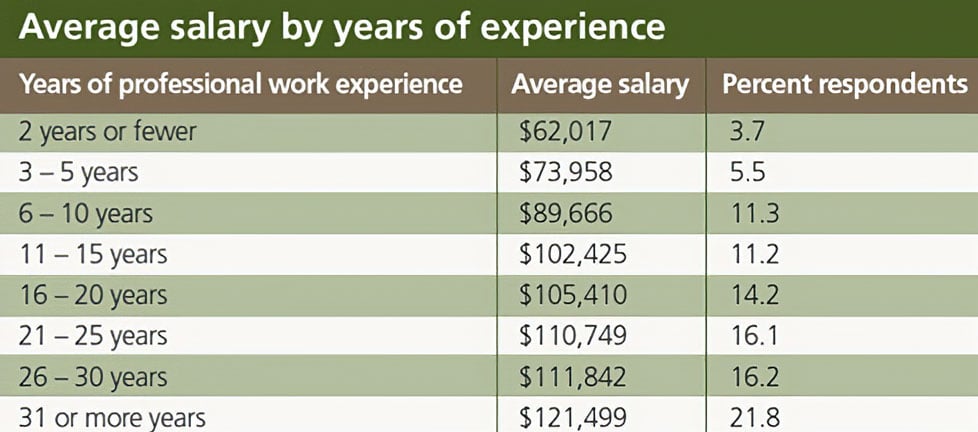
What determines job satisfaction?
This year we did not ask respondents about the factors that determine their job satisfaction. Over the years, the results never really changed. Just to refresh your memory, the feeling of accomplishment typically rated the highest. Technical challenge, benefits, salary, pleasant work environment, good relationship with work colleagues, and job security are also contributing factors. The top four most important benefits are health insurance, pension plan/401K, flexible working hours, and paid time off.
We did ask respondents to tell us if they are seeking other opportunities. Those who are actively seeking new opportunities made up 9.6 percent of respondents and had an average annual salary of $93,410—nearly $12,000 less than the average. Passive job seekers made up 41.5 percent of respondents, whose average salary was $3,500 less than average at $101,811. Those not seeking new opportunities (48.9 percent) were making $110,950—or $5,500 above the average salary.
According to data from automationtechies, a recruiting and contract staffing company based in Minn., there is a high demand for automation professionals, but high-quality candidates are hard to find. When companies do find good candidates, the candidates typically have multiple offers. Companies that employ high-quality professionals must pay them well or risk losing them.
Licenses and certifications
We compared the salary of those with a professional engineering license to those without a license. It is no surprise that those with the license (13 percent) earned an average of $23,967 more each year, or an average salary of $126,390 versus $102,423 for those without the license (84 percent).
What about those professional certifications? This year, we asked respondents to tell us if they possess any association certifications. We learned that 25.8 percent of respondents had some kind of certification, while 72.3 percent did not. The salary did not vary much between the “haves” and “have nots.” Those professionals with a certification made $107,754, while those without made $104,940.
Conclusion
Whether the demand for automation professionals increases or not, the salaries are certainly respectable. To summarize the above results, I created this recipe for how to maximize your salary:*
- Get your B.S. degree (any type of engineering will do). An advanced degree will improve results.
- Move to the West South Central region of the U.S. (Ark., La., Okla., or Texas).
- Work in the oil and gas industry segment. If that doesn’t work out, try engineering consulting or systems integration.
- Get your professional engineering (P.E.) license.
- Move up to an engineering management position.
- Convince your company to make/continue investments in technology and business integration.
- Remain an automation professional for the rest of your career. Let’s be realistic, what else are you going to do? You know the lyrics to that Eagles’ “Hotel California” song, “You can check out
About the Author
Rick Zabel is vice president and publisher of Automation.com. A special thank you goes out to all of you who took the time to complete our survey and to Jessica Kooiman and Kia Weller at Automation.com for all their help in creating the survey and compiling the data.



